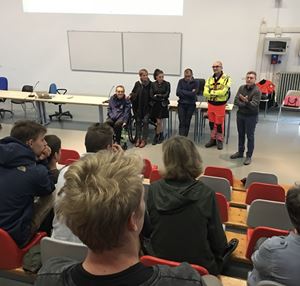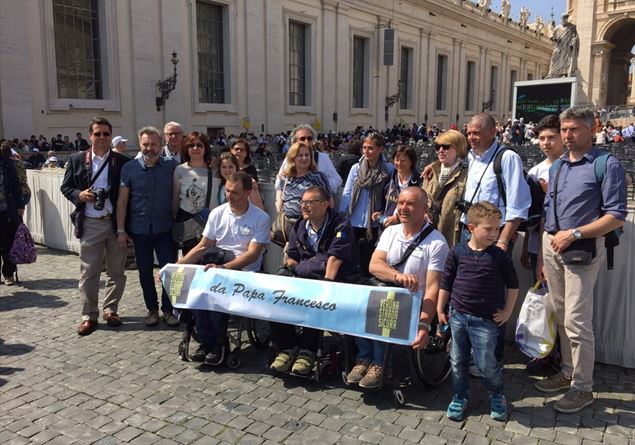In the classrooms of high schools of Verona and its province, the atmosphere changes as soon as the meeting begins. The boys enter laughing, with the phone still in hand, the backpacks on the ground. Then, slowly, the buzz turns off. Images and voices appear on the screen that tell what can happen in an instant, when the lightness of an evening turns into a point of no return. There is no rhetoric, there is no lesson tone: what you breathe is attention. Those who speak are not there to make morals, but to share a true experience, lived on their own skin, in the hope that it becomes a warning. This is the heart of Verona Safe RoadAssociation born from the meeting between law enforcement agencies, rescuers and families who have known the pain of a car accident and have chosen to transform it into commitment.
“The secret lies in doing something good, beautiful and clean for others,” he says Andrea ScampperlePresident of the Association and Commissioner of the Traffic Police. “The anger leaves it behind. The pain will never go, but you can try to transform it into help for others, especially for the boys ».
An idea that starts from the street
The story of Verona Strada Safe begins in the 90s, when Scampperle was dealing with very serious accidents, often linked to alcohol. “At the time – he recalls – there was still no attention today for prevention. As, Together with the firefighters and 118, we started entering schools with a different approach from classic road education: not only signs and rules, but direct testimonies of what we saw every weekend».
Then the checks with the heylometer were at the beginning and the so -called “Saturday evening roads” filled the black news pages. The operators intervened on accidents that often left behind more than one victim. “Going home after certain nights was not easy,” he confesses. «When you are on the spot and you can do something, you concentrate. But when you arrive and there is nothing more to do, the weight remains on you ».
The real turning point came in 2005, after an accident in which five boys in the province of Verona die. “We called the mother of one of them, Loretta. He said to us, “I want to come with you.” It was the first of many families who found in this activity a way to live with pain “.

A group that grows
Over the years, the group has expanded and structured. Today it has about ninety people, including traffic police, firefighters, 118, road auxiliaries, disabled athletes who have lost the use of the legs due to accidents, and of course the families of the victims. There are those who have lost a son, who a brother, who a friend. There are those who have undergone serious impairments and have chosen to transform their testimony into a teaching for others.
Since 2016, with the patronage of the Prefecture of Verona, the association has formally constituted and brings its format into dozens of schools every year. The meetings are not improvised: in September the calendar is prepared, the shifts are established, you decide who will go to which institution. «So – explains Scamperle – we manage to avoid that for family members will become an emotionally unsustainable routine. Telling one’s story is tiring: for this reason we alternate and you support each other ».
Three moments, a single message
The awareness mornings follow a tested scheme. It starts with the operators, who tell episodes lived on the field: accidents due to speed, alcohol, use of drugs or smartphone driving. They are not only data or numbers, but images and words that transmit what it really means to arrive first on a place where there was a few minutes before life and now there is silence.
Then The disabled athletes take the floor, direct witnesses of the consequences of an accident: stories of those who, in a moment, have seen their body and their future change forever. Finally, the most intense moment: that of the parents. Mothers and fathers who talk about their children, showing photos, telling passions, dreams, characters. It is a story of life, rather than death, and precisely for this reason it affects.
Among them there is Carlotta Manciniof which Christian family Publish the interview in this number. He is the youngest of the group, who entered after losing his twin sister in an accident he had witnessed. “Carlotta is the visible tip of a group of families who work together, supporting each other” underlines Scamperle. “Everyone has their own story and their own round to tell it.”
Beyond the testimony
Not all families who approach Verona Strada Safe are ready to speak in public. “If anger still prevails – explains the president – you risk transmitting grudge, not awareness. For this we have created a group of mutual aid: evening meetings between peers, supported by psychologists, to help those who are not yet ready ».
In parallel, the association also offers psychological support to the same operators, because sharing certain experiences, even after years of service, can be heavy. It is a network in which you listen to and you are listened to, and where the experience of each finds space and respect.
An impact that remains
During the meetings, the questions of the boys are not many. “Perhaps because we can be exhaustive and touch deep ropes,” says Scampperle. “We are not talking about codes and sanctions: those can be read at home. Our goal is to make it clear that an error can change life forever. And we don’t say it: who has already passed us».
In the end, students often leave a message on a post-it, which is hanging on the “tree of life” of the association. “They write to us:” You have opened my eyes “,” Thanks for keeping us safe “. They are simple phrases but they confirm that we have reached the heart ».
The future of Verona Strada Safe
Today the association is a point of reference for the province of Verona. “Every September we plan the calendar of schools: every Friday we are in a different institute, and sometimes even more often” says Scampperle. The commitment is voluntary, but requires organization and constancy: it takes time, it takes preparation, you need the ability to get involved without sparing yourself.
Behind each meeting there is an intertwining of professionalism, experience and humanity: policemen who have had to knock on the door of families to give the worst newsparents who have learned to tell their story, young people who choose to listen.
«Let’s not delude ourselves to save everyone – concludes Scamperle – But even if just a boy, leaving school, decides not to drive after drinking, we made the difference. And this is what pushes us to go on ».


